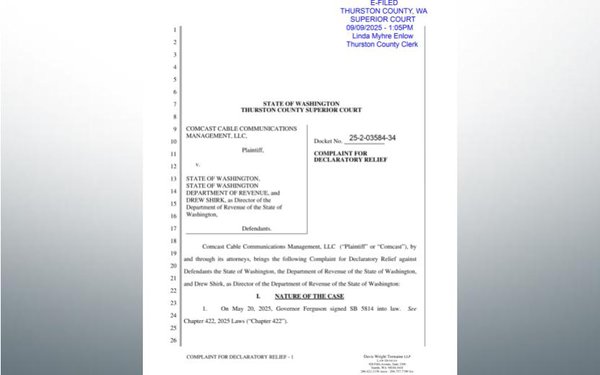
Comcast has sued
to invalidate a new Washington state law that imposes a tax on online advertising services such as creating and placing digital ads, analyzing their performance and planning online campaigns.
The measure (SB 5814), signed in May by Governor Bob Ferguson, is slated to take
effect in October.
Unless blocked in court, the law will require Washington agencies (and other businesses that assist advertisers) to collect sales tax, likely ranging from 7.5% to 10.6%, on
“advertising services.”
In a complaint filed Tuesday in Thurston County Superior Court, Comcast claims the law violates the federal Internet Tax Freedom Act, which
prohibits states from imposing discriminatory taxes on "electronic commerce."
advertisement
advertisement
The Washington state law "defines 'advertising services' subject to the tax to include only
certain advertising services," Comcast alleges in its complaint.
"Almost all forms of advertising conducted over the internet are subject to the tax, while most forms of
advertising conducted off the internet are not subject to the tax," the cable giant adds.
The Washington law defines "advertising services" as “digital and nondigital
services related to the creation, preparation, production, or dissemination of advertisements” -- including art direction, graphic design, search engine marketing, lead generation optimization,
web campaign planning, online placements and analytics.
The definition exempts services provided to newspapers, “printing or publishing,” and radio and television
broadcasting, as well as services for out-of-home signage, like billboards.
Comcast is seeking a declaratory judgment that the new state tax law is unconstitutional, arguing
that a state can't constitutionally enact laws that violate federal statutes -- in this case, the federal Internet Tax Freedom Act.
Earlier this year, the major ad industry
groups opposed the law, arguing in a veto request that the measure "threatens Washington's business community and would harm consumers across the state."
The Association of
National Advertisers, American Association of Advertising Agencies, American Advertising Federation and others -- including the tech group NetChoice and cable lobbying organization NCTA-The Internet
and Television Association -- argued in a letter to Ferguson that the legislation "would have far-reaching negative consequences for businesses, consumers, and the state’s economy as a
whole."